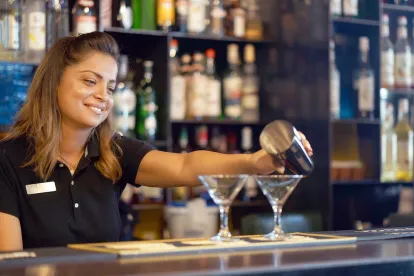On November 2, 2021, the Arizona Supreme Court decided Roberto Torres, et al. v. JAI Dining Services (Phoenix) Inc. and expanded the liability worries of bars and restaurants in Arizona. This case answers the question: Does an overserved patron’s decision to drive while intoxicated after safely reaching home or a similar resting place constitute an intervening and superseding cause that breaks the chain of causation, relieving the liquor licensee/seller of alcohol of liability? The Arizona Supreme Court held that unless the bar takes proactive steps to separate the intoxicated individual from their vehicle and/or get them a safe ride home, the bar can be found liable, even if the intoxicated individual safely made it home and then decided to leave.
Facts of the Case
On November 7, 2015, at approximately 11:20 p.m., Cesar Aguilera Villanueva (Villanueva) arrived at Jaguars, a strip club owned by defendant JAI Dining Services (JAI) in Phoenix, Arizona. Villanueva spent a few hours drinking, consuming “around six or seven beers.” At approximately 2:30 a.m., Villanueva was asked to leave the club after he became involved in a dispute with one of the club’s security staff. Several of the employees escorted Villanueva outside. Villanueva got into his truck and drove approximately 15 minutes away from the establishment to his brother’s house. He remained at his brother’s house for more than an hour to “chill out for a little bit and sober up.”
Around 4:00 a.m., a friend used Villanueva’s truck to drive Villanueva, his girlfriend and her friend to Villanueva’s house. Upon arriving at home, Villanueva fell asleep. He slept for a short time before his girlfriend woke him up to drive her friend home. The friend drove Villanueva’s truck to her house while Villanueva remained in the backseat asleep for 45 minutes. After dropping off the friend, Villanueva headed home. Just after 5:00 a.m. on November 8, Villanueva crashed his truck into a car stopped at a red light, killing two individuals inside the vehicle. The decedents’ families sued Villanueva and JAI, alleging a negligence claim against Villanueva and negligence-based claims and dram shop liability against JAI for overserving alcohol to Villanueva.
The Court’s Legal Analysis
To bring a negligence and dram shop claim, the plaintiff is required to prove a duty requiring [JAI] to conform to a standard of care, a breach of that duty, a causal connection between breach and injury, and resulting damages. Ryan v. Napier, 245 Ariz. 54, 59 (2018). JAI, as a liquor licensee, had a duty to exercise due care in serving alcohol to Villanueva to protect members of the traveling public from being injured as a result of his intoxication. JAI argued before the court that it was not the proximate cause of the plaintiffs’ injuries and that Villanueva’s decision to return home and then resume driving constituted an intervening and superseding cause of the decedents’ deaths, therefore relieving JAI of liability. The Supreme Court of Arizona rejected this argument.
The court stated that the injury-producing conduct by an intoxicated patron – operating a vehicle while impaired by alcohol – is one of the exact hazards that makes a bar owner’s act negligent and that it’s foreseeable to a bar owner that an overserved patron may drive intoxicated, causing an accident that injures or kills another, even if the individual had reached their home. Therefore, the court found this was a question for the jury and one that cannot be decided by the court. This holding puts an added duty on liquor licensees essentially to ensure a safe ride home for an intoxicated individual in order to avoid the foreseeable instance of them operating a motor vehicle while intoxicated and causing harm to the public.
The court did create a potential exception to this holding whereby it could find an intervening cause had occurred. The court cited Patterson v. Thunder Pass, Inc., 214 Ariz. 435, 440 (App. 2007), in saying that if a liquor licensee separates an intoxicated individual from their vehicle and/or ensures a safe ride home for the intoxicated individual, then it can find there was a sufficient intervening cause to support granting a dismissal on behalf of the liquor licensee as to any dram shop allegations.
Unlike the situation in Patterson where the tavern employee took an intoxicated patron home, JAI allowed Villanueva to drive his truck home. Club personnel did not separate Villanueva from his truck or ensure his safe transportation home, therefore making it foreseeable to JAI that Villanueva’s act in driving while intoxicated could result in injuries or death of another. The court reasoned that this risk is no less foreseeable solely because the patron initially returned home with the intent to sleep, eat, change clothes or partake in any activity before deciding to leave home and resume driving. The court concluded that the risk created by a bar owner overserving a patron exists for as long as the patron is intoxicated, and liability ends when the patron becomes sober. Thus, Villanueva’s decision to resume driving after reaching home did not constitute an intervening and superseding cause that breaks the chain of causation.
Takeaway
Liquor licensees/sellers of alcohol must ensure they have the procedures and staffing in place to avoid over-service of alcohol and to monitor those leaving their premises to avoid intoxicated individuals driving from their place of business. If staff notice a potentially intoxicated individual, they should offer them a safe ride home, whether by taxi, a sober friend, a corporate account with a ride-sharing company or any other safe method of transportation.




 />i
/>i
